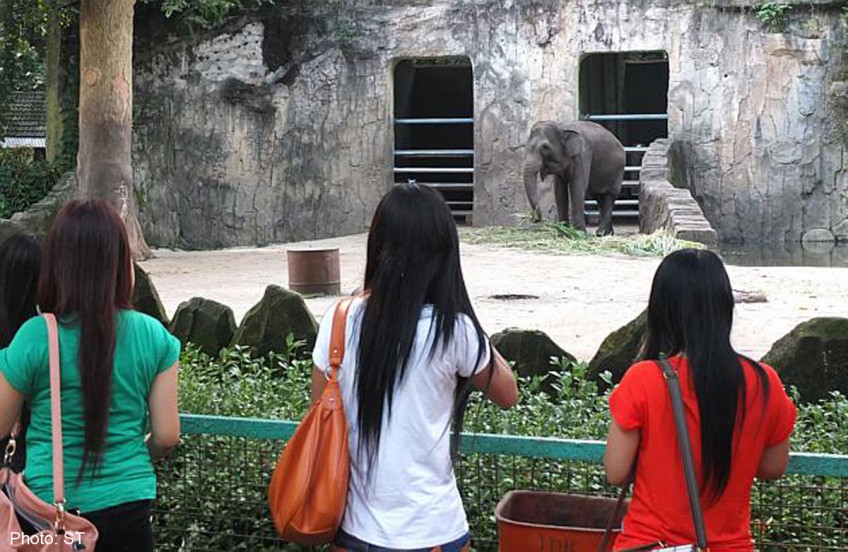Jakarta zoo seeks a makeover

Fourteen Papuan kangaroos died at Jakarta's Ragunan Zoo after three wild dogs slipped into their enclosure and set on them in November. Earlier last year, a hippopotamus died of digestive and kidney failure.
At 147ha, Ragunan is the world's second-largest urban zoo, after the Bronx Zoo in New York. It is a popular destination for families, attracting some 4.2 million visitors in 2012.
But last year's animal deaths have again cast a spotlight on its poor condition and mismanagement. Visitors freely feed animals and throw plastic bottles into enclosures. Officials want to change this behaviour as part of a makeover for the popular attraction.
"Visitors think that feeding the animals is something positive. We will have more no-feeding signboards and use our information booths to tell visitors this is not allowed," zoo spokesman Wahyudi Bambang told The Straits Times.
"We will also start imposing a 100,000 rupiah (S$10) fine on those found littering... We have a city regulation against littering, but no regulation on animal feeding. We can only appeal to visitors not to do that," he added, saying that these steps will kick in early this year.
Jakarta's no-nonsense Deputy Governor Basuki Tjahaja Purnama has taken a keen interest in the zoo upgrade.
There are plans to beef up fences, build a water treatment plant and create a huge enclosure for wild birds to fly freely among the natural trees and above a man-made lake.
Officials also plan to close the zoo on Mondays to give the animals a day off for their welfare.
Mr Basuki has said he wants the attraction to be like the Singapore Zoo, and has appointed tycoon and animal lover Hashim Djojohadikusumo - the brother of Mr Prabowo Subianto, who is patron of the Gerindra party and a presidential aspirant - to take charge of the overhaul.
Mr Basuki expects Mr Hashim to tap into his wide network and collaborate with zoos abroad.
Zoo spokesman Wahyudi said the Singapore Zoo is the benchmark. "The Singapore Zoo is an inspiration for us," he said. "We are learning from them."
Mr Wahyudi spent a whole day with zookeepers in Singapore in 2012 to study how things are run there. He and his colleagues also visited the Jurong Bird Park, taking notes on the professionally run and attractive animal shows, among other things.
He also noted that the Singapore Zoo covers less than one-fifth Ragunan's area but has a collection of animals from tropical, sub-tropical and arctic climates, whereas Ragunan only has tropical animals.
Ragunan Zoo was founded in 1864 in the central Cikini area on land granted by famous Indonesian painter Raden Saleh, but moved to its current location in 1966.
Upon walking into it, visitors feel like they are entering a combination of the Jurong Bird Park and Singapore Botanic Gardens.
Visitors are welcomed by dozens of pelicans on a pond right after they walk past the entrance gate, in a display similar to that of Jurong Bird Park with its flamingos. The difference is that at Ragunan Zoo, huge, leafy trees also dominate the surroundings.
But the rich natural resources at the Jakarta zoo are not supported by adequate infrastructure or professional management.
A lack of transport facilities within the compound is one weakness that needs to be addressed, say visitors like Mrs Sukarni, 61, who was there with her granddaughter. "We waited for the carriage too long and we walked too much. But the entrance ticket price is ideal," she said.
Visitors pay just 4,500 rupiah each to enter.
A motorised carriage that takes visitors around the zoo reaches only certain animal enclosures, forcing visitors to walk a long way to reach animal enclosures farther away from the carriage tracks.
The carriage also speeds up at times and does not have a guide giving explanations as it travels past animal enclosures.
Officials say ticket prices will have to be raised to improve the visitor experience and better manage the animals' welfare.
"Ragunan is the zoo with the world's cheapest entrance fee right now," said Mr Wahyudi.
But Mr Jhonny Allen Marbun, an MP who worked at the zoo for 20 years and was its acting director, told the Quran Tempo daily that fixing it will be an uphill task. A zoo, he said, has to be a conservation, research and education centre, a green belt area and a recreational space all at once.
Observers also say mismanagement of funds by rogue officials may be an issue. Reports that animals are not being fed adequately and on the poor condition of zoo facilities crop up regularly.
Zoo employees in Indonesia have been caught stealing meat intended for animals, and sometimes, in the case of rare species, stealing the animals themselves, the Associated Press reported in 2010, citing Mr Tonny Sumampouw, chairman of the country's zoo association.
Mr Hashim has pledged to tackle corruption and abuse. The Jakarta zoo takes in about 20 billion rupiah a year, with the city government covering the shortfall in the reported annual operational cost of about 55 billion rupiah.
Meanwhile, visitors continue streaming in. Bank officer Adi Wibowo, 32, the father of a toddler, said: "Where else can you pay 4,500 rupiah and get so much? You can see animals, throw a picnic mat on the grass, or find a dating spot among the trees here."
wahyudis@sph.com.sg
Get a copy of The Straits Times or go to straitstimes.com for more stories.